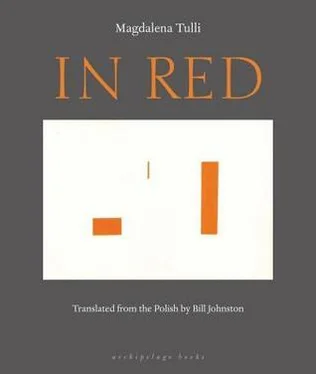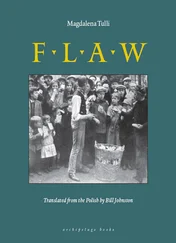“How can anyone change beyond recognition like that,” the women who worked for Strobbel said, still remembering an indistinct figure in a striped silk vest. “Before the war he used to be good-looking and nice, now you can’t say a word to him.”
When Slotzki would tip his hat back on his bald head as he walked down the street, the ladies would cry out and quickly look away. He was shunned like the plague and never invited to dances in homes where there were marriageable young women. His unsightliness counted more than Strobbel’s entire works, which he was slowly setting in motion again after the wartime interruption, and which he was to inherit. He worked from morning till night, not sparing anyone, especially the bookkeepers, whom he liked to torment with abrupt summonses, occasionally even before breakfast or after supper. They would come running, only half awake, given away by their misbuttoned clothes. From behind the closed door of his office Slotzki’s raised voice and his heavy footsteps could be heard. “It’s your bounden duty!” he would shout, hammering his fist on the table. But even that failed to bring him relief, so he would grab a wooden ruler and snap it in two like a match.
“Four rulers since yesterday,” word would go around the factory.
A porcelain washbasin with a soap dish and water jug were placed in his office. Once a week he received business visitors, who had to make an appointment ahead of time. A spotty boy who ran errands would go out into the corridor and call suppliants in turn, deliberately mispronouncing their names. Slotzki’s black pointer lay by the door and followed those entering the office with his eyes, fangs bared.
“Good dog,” one or another of them would mumble, squeezing against the wall in the passageway.
The water in the jug ran out even before midday.
“Max!” Slotzki would yell, raising his hands and pushing them away from himself so as not to dirty his clothes. Boy and dog would jump to their feet simultaneously, for both had the same name. Slotzki got through about as many jugs of water as he did rulers. He disliked heartbreaking stories, and made no bones about showing it. Women left his study sniffling and wiping their eyes on a corner of their apron; men would be gritting their teeth till they made a grinding sound. Seeing this, the dog would begin to growl, all set to leap at their throats.
“Down, you bad boy,” Max Fiff would hiss in his ear, struggling as he held on to the dog’s collar with all his strength. Slotzki would poke his head out into the corridor.
“What’s going on out here?” he’d snap.
Out of breath, Max Fiff would roll back his sleeve and show the bite marks on his forearm. But Slotzki barely glanced at them.
“Both of you calm down, dammit!” he’d exclaim, and slam the door so hard the walls shook.
Felek in the meantime every morning would plod across the heaps of broken porcelain, crunching pink roses on a white background into the black mud. He didn’t spare a single glance for earth or sky; he only looked at the stores, the shops, the boarded-up fuel depots. He spent his afternoons at Corelli’s café. A Turkish cigarette in the corner of his mouth, he would laboriously read the announcements of real estate sales in the newspapers, following the words with his finger. The pages gave off a promising grayness that mingled with the cigarette smoke; the waiters floated in it as if in turbid water, raising their trays over the heads of the customers. As they passed Felek they would look askance at the clumsy handwriting in which he was making notes with an indelible pencil on a paper napkin. He sweated over his reading, wiping his forehead on a white handkerchief that bore the elaborate monogram of Kazimierz Krasnowolski, who had fallen in the war.
“Check,” he would call the moment he was done with the newspaper. His tips secured him polite treatment. Though he bore himself like a civilian, the desk clerk at the Hotel Angleterre clicked his heels when he saw him and called him lieutenant.
“It’s only Felek Chmura,” the maids would whisper, giggling and casting glances.
“Not to you he isn’t, not anymore, you silly creatures,” the desk clerk would scold them. “And don’t even think of trying to be familiar.”
In short order Felek seduced every one of the maids in turn, without any promises or declarations of love. Their names vanished from his memory right away. More than anything else, awake and in his sleep, he was preoccupied with estimating the value of all the movable and immovable property his eye came to rest upon. He had abacuses brought to his hotel room. In the early morning he would go and stand outside an apartment building he’d seen the previous day, unsure whether the guttering was actually copper, or the basements occupied.
“There’s a place overlooking the street on the second floor that’s available,” the concierge would inform him, coming out with a broom.
“Let me tell you the history of this building.” A beggar would call out to him, grabbing his sleeve in the gateway.
Soon Stitchings had no secrets from him: he knew exactly how much it was worth at market prices, or converted to demolished state.
“Does he still have money?” the owner of the Hotel Angleterre asked the desk clerk, leaning across the counter. “What on earth does he do all day?”
Real estate was cheap at that time. Felek bought empty lots on Factory Street, fenced them off, and ordered bricks.
“Who builds anything here?” passersby asked, and for want of a reply would answer themselves, saying that Neumann’s and Strobbel’s factories were probably putting up new warehouses.
Felek Chmura’s people bought up imperial Russian gold coins on the black market, in any amounts. They located deposits of them unerringly, capable of sniffing them out anywhere, even if they had been underground. In the countinghouses they threw fistfuls of them on the tabletop; occasionally a lump of dried soil would crumble from them. During this time the local marketplace was dominated by empty wallets, suitcases with broken locks, and stolen clothing, among which starving ragamuffins roamed, on the lookout for a potato left behind in a puddle, which they would pick up and eat, even raw. But there wasn’t a single one, for where would it have fallen from? The stalls offered everything except foodstuffs, which seemed to have vanished from the face of the earth, hiding from unreliable Polish crowns and German marks. Potatoes, if they even existed, were far away, buried in clamps by people who no longer believed in any currency whatsoever. It was only out of a habit deeper than faith that they were prepared to accept tsarist five-ruble gold coins long withdrawn from circulation.
By night, wagons heaped with potatoes would pull up in front of Felek Chmura’s warehouses. The goods were unloaded in a hurry, under cover of darkness, as the star of good fortune twinkled over the town hall clock. Felek personally saw to it that nothing went missing. In the early morning still-sleepy storekeepers, anemic and transparent as air, would appear and collect their wares, three hundredweight each. Felek would not agree to any more. His right-hand man, red-haired Adaś Rączka, in outsized knickerbockers, would scrupulously measure out the potatoes.
“That’s enough,” he would say. “Next.” In the afternoon, in Corelli’s café Felek would fall still over his coffee cup, newspaper in hand, cigarette between his lips. Eventually he would be woken by the clatter of a falling spoon. He would set the paper aside, pay, rise from the table and, cigarette in his mouth the whole time, would cross the street to the hotel.
“He’s bored,” the hotel staff would remark.
As Chmura took his room key, a cone of cigarette ash would fall and scatter on the open registration book.
Читать дальше












